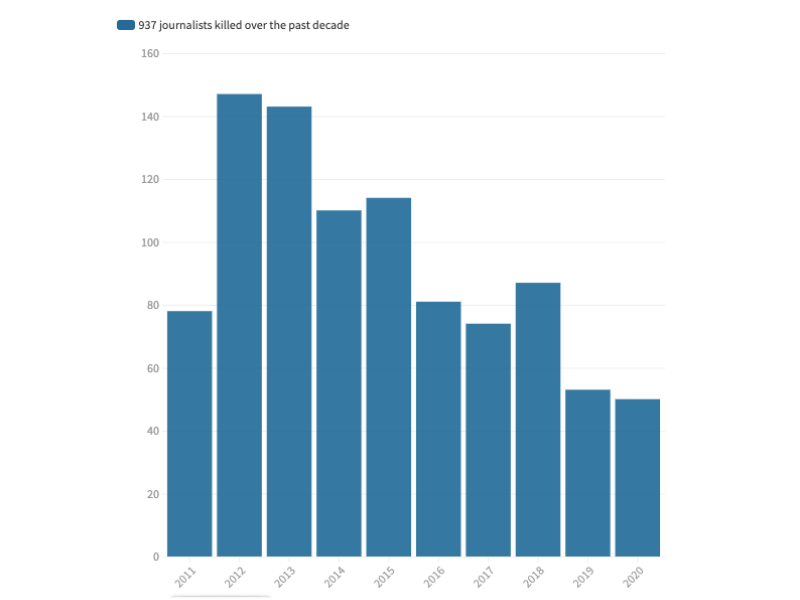In 2020, at least 50 journalists and media workers were killed and 387 more have been detained in connection with their work according to the latest annual report by Reporters Without Borders (RSF).
Part two of the report covers data that was collected between 1 January 1 to 15 December and describes how 50 journalists have been killed, two-thirds of the killings taking place in countries which are not, officially or otherwise, at war.
A staggering 84% of those killed were deliberately targeted because of their work, with some of the killings being particularly barbaric.
The most dangerous stories to cover were investigations into the misuse of public funds or local corruption (10 journalists killed), organised crime (4), and environmental issues such as illegal mining or land-grabbing (3). Seven (7) journalists were killed covering protests, while threee more died after having likely contracted COVID-19 in prison.
Even though the overall number is down from 53 in 2019, this may simply be due to the fact that fewer journalists were out in the field due to the pandemic.
The first part of the report documented a total of 387 detained journalists, just two less than last year, keeping this number at a historically high level. More than half of those detained (61%) are held in just five countries: China, Egypt, Saudi Arabia, Vietnam and Syria. At least 54 journalists are being held hostage in Syria, Yemen and Iraq.
This year also saw a 35% rise in the imprisonment of women journalists bring the number up from 31 in 2019 to 42 in 2020. Most of the new arrests (4) took place in Belarus, following a brutal crackdown since August’s disputed elections.
In the shadow of COVID-19
According to the data gathered by RSF staff and Tracker 19 (RSF’s monitoring tool), the three months between March and May saw a fourfold increase in arbitrary arrests of journalists around the world as the virus first started to spread.
Between February and November 2020, arbitrary arrests alone represented 35% of the press freedom violations logged, while another 30% consisted of threats and physical violence. Many arrests lasted a few hours, others a couple of days or weeks but 14 journalists who were arrested because of their coverage of the pandemic, are still detained.
China remains the country with the highest number of journalists detained because of their reporting on the pandemic, with seven in total, while Bangladesh, Myanmar, Jordan and Iran all have journalists that are still being detained for their work linked to the Covid-19 pandemic.

937 journalists killed over the past decade. Source: RSF (2020)
Press freedom incidents were also recorded by RSF in Europe. In Hungary, the government passed a “coronavirus” law that allowed Prime Minister Viktor Orbán, to rule by decree during the state of emergency for an indefinite period. The legislation included a provision for sentences of up to five years in prison for spreading ‘fake news’.
In Italy and Germany, journalists were attacked while covering protests against COVID-19 restrictions, while another journalist in Italy was threatened for reporting that the Sicilian mafia was trying to recover its former influence by distributing free food in Palermo during the coronavirus lockdown.
In the UK, government officials were becoming increasingly hostile towards those media outlets that reported on stories related to the pandemic. These included labelling media as “campaigning newspapers” and introducing restrictions on journalists’ participation in government press briefings.
RSF’s round-up comes days after the Committee to Protect Journalists (CPJ) reported 2020 to be the worst year on record for the imprisonment of journalists.
In Malta
In Malta, freedom of information requests about the government’s transition plan and risk assessments for easing COVID-19 restrictions over the summer were rejected by the Superintendence for Public Health. A journalist was blacklisted by the Ministry of Health until he apologised for having criticised the Ministry’s lack of feedback.
COVID-19 restrictions caused a delay in court proceedings related to the public inquiry into the assassination of Daphne Caruana Galizia. The delays were then used by the government to exert pressure on the public inquiry to wrap up its work. The Shift and its founding editor, Caroline Muscat, were also subjected to a coordinated attack for highlighting the lack of transparency in the distribution of government funding to media houses in Malta.
RSF fully supports @muscatcar and our partner @TheShiftNews, and condemns attacks against them. The Shift is a vital source of independent reporting in the midst of a deeply divided and politicised media landscape, as Malta's press freedom record continues to deteriorate. 1/
— RSF (@RSF_inter) December 4, 2020
More bad news
2020 also saw some of the harshest penalties being handed to journalists such as that of Maria Ressa, one of the Philippines’ most prominent journalists, co-founder and director of the independent news website Rappler, who was found guilty of the criminal offence of “cyber libel” over an article published in 2012 that was the subject of a complaint by a businessman. Ressa, 56, and her colleague were allowed to remain free on bail, pending a possible appeal. But if the conviction stands, it will carry a prison sentence of up to six years.
More recently, a court in Turkey sentenced journalist Can Dundar to more than 27 years in prison for allegedly supporting terrorism and military and political espionage. The sentence was delivered in the absence of the journalist, who has been living in exile in Germany since 2016. In a comment to Deutsch Welle, Dundar said the verdict did not surprise him and that “They wanted to punish me because of this true story and at the same time try to intimidate other journalists in Turkey who dare touch that kind of sensitive issue”.












